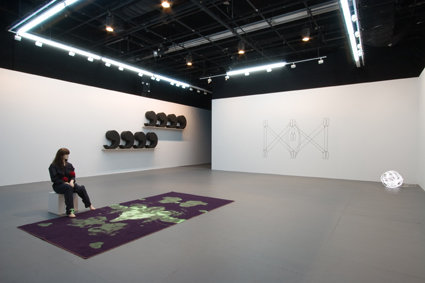Mai-Thu Perret
dal 12/6/2008 al 25/7/2008
Segnalato da
12/6/2008
Mai-Thu Perret
Galerie Barbara Weiss (old location), Berlin
On 1 July 1946, a US American B-29 dropped the first post-war atom bomb onto Bikini Atoll. Thus Bikini Atoll gave the name to a new fashion in bathing suits. The taboo was broken, and the striking name, which translates as "land of the coconuts," itself had the effect of a bomb.

The oeuvre of Swiss artist Mai-Thu Perret (born in 1976), who works in
New York and Geneva, operates within ideological and visual frames of
reference pertaining to modernism and its revolutionary potential. From
the perspective of the producing recipient -- Perret did not formally
study fine art, but rather English literature, only later to take part
in the Whitney Independent Study Program -- the artist is interested in
twentieth-century avant-garde movements and their vocabulary, insofar as
it stands for emancipation and a belief in progress. Since 1999 Perret
has been writing /The Crystal Frontier/, a fictional report in the form
of a journal about a group of young women who have founded an secluded
alternative commune somewhere in the desert in New Mexico. In
conjunction with writing, Perret also creates sculptures and
installations, often as hybrids between art, handicraft, design, and
literature, which she identifies as hypothetical products by the
protagonists of this fictional community. Perret transfers her own
artistic authorship onto imaginary subjects that she herself has created.
Following on from Perret's 2006 exhibition /Apocalypse Ballet/ (2006),
in which the artist transformed the exhibition space into an avant-garde
stage set with four paper maché mannequins in frozen dance movements,
Galerie Barbara Weiss is now pleased to present a second solo show by
Perret entitled /Bikini/. Perret's work enjoys international renown, and
she recently exhibited in the Kunst Halle Sankt Gallen and in the
Bonnefanten Museum in Maastricht.
On 1 July 1946, a US American B-29 dropped the first post-war atom bomb
onto Bikini Atoll, thus marking the start of extensive testing. Only a
few days later the French fashion designer Louis Réard sent model
Micheline Bernardini down the catwalk in Paris, wearing only four small
triangles of fabric that were printed with newspaper reports about the
dropping of the bomb. Thus Bikini Atoll gave the name to a new fashion
in bathing suits. The taboo was broken, and the striking name, which
translates as "land of the coconuts," itself had the effect of a bomb.
The very skimpy new bathing suit -- "like the bomb the bikini is small
and devastating" -- was greeted with similar moral outrage to the
American atom bomb testing on Bikini.
By choosing this loaded and historically significant name for her
exhibition title, Mai-Thu Perret refers to precisely these events. She
places three varnished sculptures shaped like atomic mushroom clouds in
the centre of the gallery, alluding to a well-known and often reproduced
1946 photo. This shows Admiral Blandy, the officer who was responsible
for the test, and his wife celebrating the completion of the /Operation
Crossroads/ test series with an enormous edible "atomic cake". By citing
precisely this cake, Mai-Thu Perret recalls the inflationary and
unscrupulous belief in progress that was current in the USA at the time,
an ideology that had no notion of sustainability. The original atomic
cake was a remarkably naive object created with simple non-technological
means, and an ambivalent and provocative symbol of a narcissistic belief
in simple and straightforward progress. Translated into artistic/applied
art products, Perret's atomic cakes go a step further. They appear to be
simple, childish handicrafts, a "cake-like" approach to sculpture in a
frozen varnished piece of art.
The colour textile banners that Perret has hung on the gallery walls are
similarly ambivalent. The embroidered brick motiv is dissolved by the
softness of the fabric and the folds of the material.
In addition, Mai-Thu Perret shows a silkscreen print with the pattern of
the first bikini designed by Louis Réard and original drawings from her
/Black Noise Book/, which is part of a series that she published
together with John Armleder and Amy Granat in memory of their deceased
friend Steven Parrino.
As the artist herself says, the exhibited objects are not directly
connected to /The Crystal Frontier/. But they do have some similarities;
they share a fascination for mystical phenomena (in this case the
possibility of the total destruction of identity by the atom bomb) and
also the creative reduction of symbols to simple techniques and motifs.
The question of the significance of the female body is also a key
concern of the artist in /Bikini/. A further aspect that connects the
/Bikini/ exhibition with /The Crystal Frontier/ is the fact that later
American nuclear tests took place in the North American deserts, in
Death Valley or New Mexico. As Perret's invented women's commune is also
supposed to be located somewhere there, then this represents a certain
continuity -- of secrecy and isolation.
Opening: Friday, Juni 13, 2008, 7-9 pm
Galerie Barbara Weiss
Zimmerstrasse 88-91 Berlin
Gallery hours: Tuesday-Saturday, 11 am--6 pm



